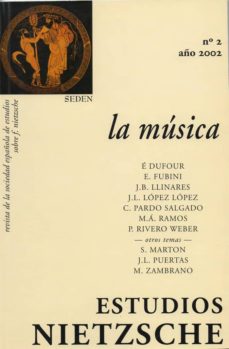El anillo roto
DOI:
https://doi.org/10.24310/EstudiosNIETen.vi2.8796Abstract
No es común el que puedan reunirse las figuras del filósofo y del musicólogo o del compositor, aunque serían precisas para acercarse a una personalidad que las aúna, con lo que los resultados normalmente pasan por el olvido de una faceta fundamental para entender la organización mental de las decisiones de un autor, en relación con una obra que niega la especialización y se tiende hacia la recogida de una vitalidad fluyente, en perfiles no precisados sino en constante crisis: la realidad, en su fluencia infinita, siempre aparece para el autor como un obstáculo entre dos vías. Desde la musicología tenemos otra variante de la especialización que nos resulta del mayor interés. Podríamos resumirla en la pregunta bien intencionada de quien, al encontrar en el interlocutor una afición por las composiciones de Nietzsche no tarda en preguntar: realmente, ¿es buena? Haciendo un juego pirotécnico verbal, al uso de Eco, la única respuesta es ambiguamente lapidaria: Merece la pena. Este artículo aborda esta parcela desconocida del autor.
Downloads
References
F. Nietzsche, Sämtliche Werke. Kritische Studienausgabe, ed. G. Colli y M.Montinari, Berlin-New York / München: W. de Gruytrer, 1980.
M. Schenieder, Musiques de Nuit, Odile Jacob, París, 2001.
Published
How to Cite
Issue
Section
License
As of issue 21 (2021) this journal is published only in open access (diamond route).
From that number 21, like the previous numbers published in NIETZSCHE STUDIES, they are subject to the Creative Commons Acknowledgment-NoComercia-ShareIgual 4.0 license, the full text of which can be consulted at <http://creativecommons.org/licenses/by-nc-sa/4.0 >
It is the responsibility of the authors to obtain the necessary permissions of the images that are subject to copyright.
This work is licensed under a Creative Commons Attribution-NonCommercial-ShareAlike 4.0 International License.
Copyright generates two different rights: moral rights and patrimonial rights that EJFB recognizes and respects. Moral rights are those relating to the recognition of the authorship. They are rights of a personal nature that are perpetual, inalienable, unseizable and imprescriptible as consequence of the indivisible union of the author and his/her work.
Patrimonial rights are those that can be derived from the reproduction, distribution, adaptation or communication of the work, among others.







11.png)
